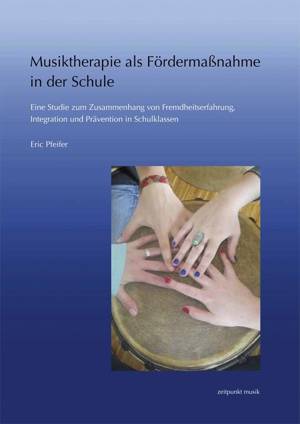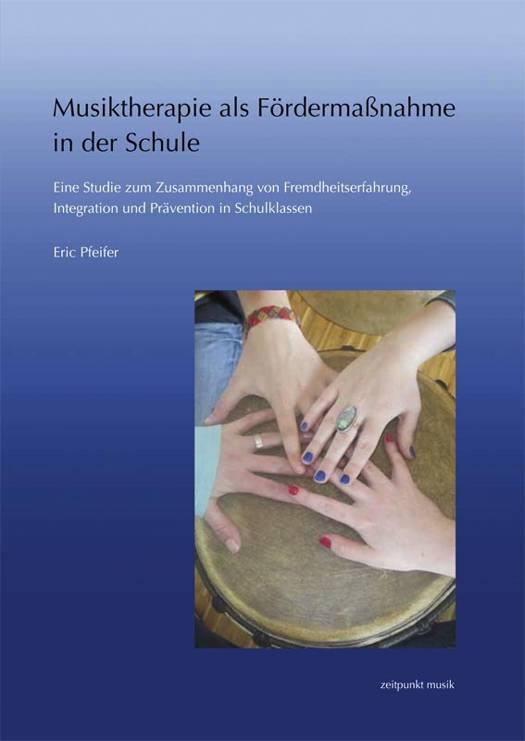
- Retrait gratuit dans votre magasin Club
- 7.000.000 titres dans notre catalogue
- Payer en toute sécurité
- Toujours un magasin près de chez vous
- Retrait gratuit dans votre magasin Club
- 7.000.0000 titres dans notre catalogue
- Payer en toute sécurité
- Toujours un magasin près de chez vous
Musiktherapie ALS Fordermassnahme in Der Schule
Eine Studie Zum Zusammenhang Von Fremdheitserfahrung, Integration Und Pravention in Schulklassen
Eric Pfeifer
125,95 €
+ 251 points
Description
English summary: The present pilot study is using theoretical, practical and scientific knowledge in order to focus the possibilities and competences of music therapy approaches in today's schools and everyday school life as affected by migration and interculturality. What is more, the preventive, integrative and supportive aspects of music therapy in this field shall also be discussed. Using qualitative and quantitative methods, questions concerning self concept and multimodality are handled as well. In particular, there is a triangulation of methods, combining standardised quantitative testing, participant observation and video sequential analysis. The task is to explore the children's ideas and possibilities of implementing and using bodily and multimodal expressions for the purpose of bridging foreignness, feelings of foreignness in themselves and/or between themselves and their classmates in a music therapy setting. Another question concentrates on eventual positive effects of such music therapy approaches referring to the development of the self, self concept and identity. Constantly, the mentioned and offered assumptions are derived from practical experience gained through a music therapy project that took place in a class with first-graders at a primary school in Austria. Last but not least, additional cross-references relating to relevant contents (current status of intercultural music therapy research and practice, music therapy in schools, music therapy and musical education) are invoked and argued. German description: Die hier vorliegende Pilotstudie widmet sich aus theoretischer, praktischer wie auch forschender Perspektive den Moglichkeiten und Kompetenzen musiktherapeutischer Vorgehensweisen im heutigen, von Migration und Interkulturalitat gepragten Schulalltag. Dabei werden sowohl die praventiven, integrativen und fordernden Aspekte einer in diesem Feld angesiedelten musiktherapeutischen Arbeit thematisiert, wie aus qualitativ und quantitativ wissenschaftlicher Sicht Fragen hinsichtlich Multimodalitat und Selbstkonzept nachgegangen wird. Im Speziellen liegt das Augenmerk des forschenden Tuns mittels standardisierter Testung, Teilnehmender Beobachtung und Video-Sequenzanalyse darauf, welche Ideen und Moglichkeiten des ganzkorperlichen, multimodalen Ausdrucks Kinder mit und ohne Migrationshintergrund in einem musiktherapeutischen Setting entwickeln und nutzen, um 'Fremdheit', Gefuhle des 'Fremdseins' usw. in sich selbst bzw. zwischen sich und ihren Mitschulern zu uberbrucken. Eine weitere Fragestellung konzentriert sich auf die moglichen positiven Effekte derartiger musiktherapeutischer Ansatze in Bezug auf die Entwicklung und Forderung von Selbst, Selbstkonzept und Identitat. Stets beruft sich der Autor hierzu auf praktische Erfahrungen, welche auf einem in einer ersten Klasse Volksschule in Osterreich durchgefuhrten Musiktherapieprojekt beruhen. Gleichzeitig werden zusatzliche Querverweise zu relevanten Inhalten - z. B. dem aktuellen Stand interkulturell-musiktherapeutischer Forschung und Praxis, Musiktherapie und Schule, Musiktherapie und Musikpadagogik - angestellt und diskutiert.
Spécifications
Parties prenantes
- Auteur(s) :
- Editeur:
Contenu
- Nombre de pages :
- 392
- Langue:
- Allemand
- Collection :
Caractéristiques
- EAN:
- 9783954900138
- Date de parution :
- 16-07-14
- Format:
- Livre broché
- Format numérique:
- Trade paperback (VS)
- Dimensions :
- 170 mm x 240 mm
- Poids :
- 706 g

Les avis
Nous publions uniquement les avis qui respectent les conditions requises. Consultez nos conditions pour les avis.






